'I'll die with cancer and can't change it but I can change these people's lives'
Jonathan Harding travels to the Poland-Ukraine border on racing's rescue mission
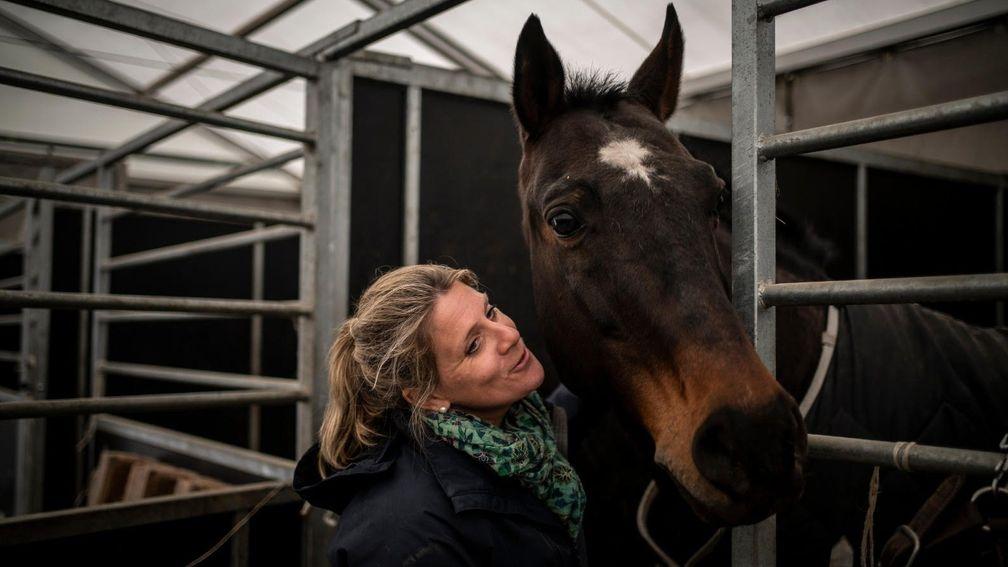
This article, originally published for Members' Club Ultimate subscribers in July, has been republished as part of our Best of 2022 series. To read all of the series, and get the best of our award-winning journalism every day, sign up to Members' Club Ultimate here. Select 'Get Ultimate Monthly' and add code BESTOF50 to get 50 per cent off your first three months.
Saturday, June 25 — Newmarket
CNN: Ukraine to withdraw from key city of Severodonetsk
The Russian invasion of Ukraine sent shockwaves around the world.
On February 24 we witnessed images of the first missiles and airstrikes hitting the capital, Kyiv, and other cities, and after months of heavy fighting and destruction there is no sign of the violence abating.
The brutal conflict has fuelled Europe's largest refugee crisis since the second world war. Reuters estimates at least 17 million people have been displaced, while more than six million have fled the country.
It is easy to feel powerless and detached from suffering on such an enormous scale. It feels inconceivable that such an event could take place in 2022.
But that does not mean nothing is being done to help, including by members of the racing community who have stepped forward to drive thousands of miles to deliver supplies to the Poland-Ukraine border.
Among those to have answered the call is Gay Kelleway, who was motivated to help the thousands of horses, dogs and cats left to fend for themselves in the warzone. She is not one to beat about the bush and I am one of the volunteers who are quickly put to work loading feed, pet food and electric fencing into a horsebox and van.
The trainer has juggled raising donations and making media appearances with her day job and has pulled together a team of volunteers to drive more than 1,000 miles to an equine rescue hub near Rzeszow in south-east Poland.
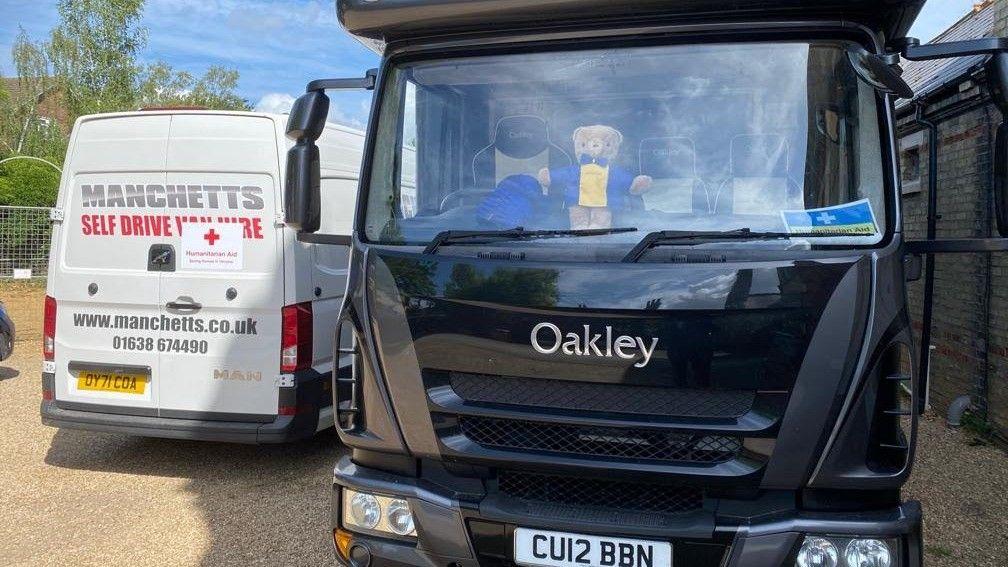
Kelleway is making her third trip, having been inspired by former trainer Charlie Mann, who led a humanitarian mission in April under the banner of Racing To Help Ukraine. He had employed Ukrainian Kyryl Shvetsov as head lad for many years and delivered tinned food and humanitarian aid, while Kelleway had sourced equine supplies and arranged a different trip.
"I've been a doer my whole life and I don't like to waste an hour," she says. "I was horrified by the condition of the horses on our first trip and felt we had to do more for them. It has been a life-changing experience.
"Other equestrian disciplines have done bits and bobs but racing has been different class. If everybody stepped up it would make a huge difference. It would break your heart the things we've seen over there. Progress is precious and we've got to keep the momentum going with donations."
With the horsebox and van creaking under the weight of their loads, we set off to Harwich to board the overnight ferry to the Hook of Holland. I travel with Aidan Bocci, who runs a software company. He has no racing connection and was called up to join the aid mission just the day before.
He had grown tired of sitting in Zoom meetings in his living room and fortunately is no stranger to adventure, having been on a number of expeditions to Africa while he was studying biology at Oxford university.
We drive for a little more than an hour, a short journey compared to the marathon facing us when we arrive in Holland, and meet two more volunteers: Julia Bennet, who has worked in racing for most of her life, and David Dormer, who was head lad to leading trainers including Geoff Lewis.
Their small horsebox was lent by former trainer Philip Mitchell, who runs a transport company in Lambourn and went on a similar relief mission to help Bosnian and Croatian refugees in the 1990s. It carries humanitarian supplies including old clothes, shoes, car seats and first-aid kits – these are important as children require them to be permitted to attend school.
There are inevitably nerves before we board. I still do not know quite what to expect and you never know how you will react to what you find. "It will change your life a bit," Bennet says. This is dismissed with a nod. I would later learn it was an understatement.
Sunday, June 26 —Germany
CNBC: Russia strikes Kyiv as Western leaders meet in Europe
The devastating context of our trip is brought into sharp focus as news filters through of 14 missiles being fired at Kyiv ahead of a Nato summit on Tuesday. The first strikes against the capital in three weeks killed one person when striking residential buildings and hitting a kindergarten courtyard.
After a rude awakening by the ferry's Tannoy, we drive through Holland with fresh impetus. While the smaller vehicles press on ahead, the lorry carrying Kelleway, me and volunteers Jenny Cassan and Neil Carson, son of Willie, trudge along behind but we soon reach the German border.
We still have more than ten hours to go so there is lots of time to get to know one another. Cassan, a showjumper who now runs a sock company, took humanitarian aid to a refugee centre in Albania during the Yugoslav wars. She has made one trip to Poland and sourced the electric fencing. "I thought it could never happen again, but here we are," she says.
With her partner, former trainer Tim Thomson Jones, Cassan delivered supplies in a lorry so full they had nowhere to sleep and spent a week at the hub trying to understand what was needed ahead of this aid mission.
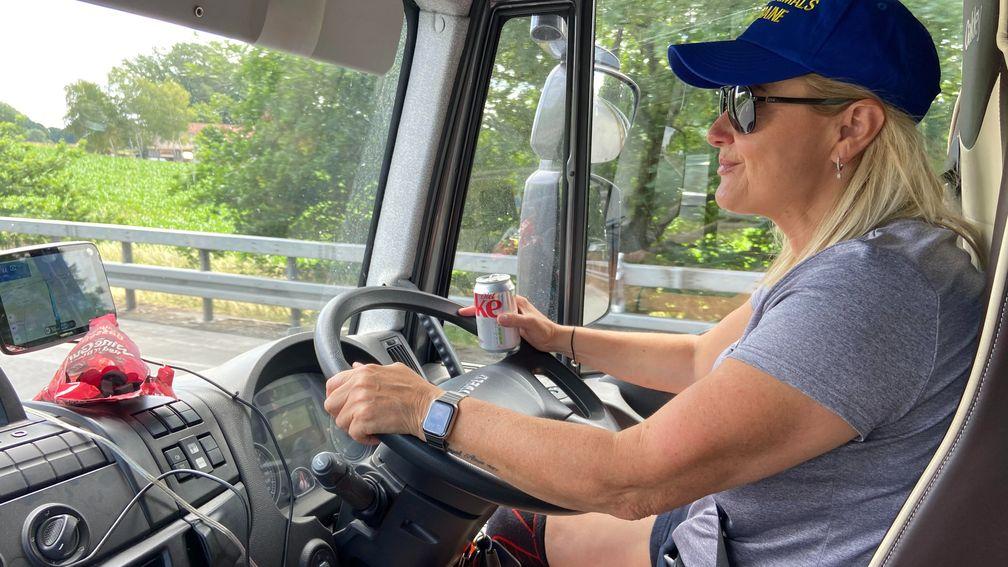
As we follow the monotonous route towards Dresden, talk turns to the team's previous trips. On the last return journey, Kelleway and Carson brought back a mother and daughter who had escaped Ukraine with their horse and hoped to start a new life in Portugal. Russians had occupied a nearby village and they made a split-second decision to flee their home.
It is difficult to comprehend how difficult it must have been for them to put their trust in complete strangers. Their lives were not so dissimilar to ours, yet by virtue of living so close to a hostile nation they had to drop everything, pack their lives into bags, and flee a war they did not choose.
Their story had a profound effect on Kelleway and Carson, who warned it would be little details that would make the most impact on me. He was struck by the weight of the mother and daughter's suitcases when he carried them off the lorry in Holland, before they travelled to Portugal via Bordeaux racecourse. They contained all their most important possessions.
"Somebody has to help," Carson says when asked why he keeps coming back to deliver supplies for animals and people. We continue on the long drive to eastern Poland with the mother and daughter stuck in my mind.
Monday, June 27 —Glogow Malopolski
The Guardian: At least 16 dead as Russian missile hits shopping centre
After a brief stop at a mosquito-ridden hotel we arrive at the Polish equine hub in Glogow Malopolski, just 100 miles from Lviv. Here we meet Charlie Thornycroft, who arrived on a fact-finding mission for the British Equestrian Federation in March and lives at the hub.
A former PA to Khalid Abdullah and Juddmonte chief executive Douglas Erskine-Crum, Thornycroft worked in events and was planning Platinum Jubilee celebrations at Royal Windsor when she chose to drop everything to help rescue the thousands of horses running loose throughout Ukraine.
She survives on next to no sleep and has been back to Britain only once since March. Using the hub as a base, she has orchestrated the rescue of close to 500 horses and sent veterinary supplies in the other direction. She uses five drivers, one of whom is Russian and often goes missing.
Getting horses over the border from Ukraine is a logistical nightmare. It requires mountains of paperwork and it can take up to 48 hours to get them into Poland after they are collected from hubs in Lviv and near Chernobyl. These are horses of all types, including a few racehorses.
They often arrive in terrible condition. There is evidence of Russians slashing horses and burning the ground. Many suffer from colic as they have been eating anything they find and those who survive the torturous journey are treated by a Polish vet named Kuba before being relocated.
The hub consists of around 60 boxes in four basic, temporary tents on the site of a stylish equestrian centre. It currently houses 17 horses belonging to a showjumping team led by a man called Greg, who moved to Ukraine from France. Surnames and details of old lives are mostly left at the door.
He travelled to Poland with three grooms and three riders, and they have formed a makeshift family as Greg has had to take on the role of father and mentor alongside coach. One of the riders, Natalia, won a competition in Krakow the week before we arrived.
The riders are young girls living away from their families. Their mothers crossed the border shortly before May 9, Russian Victory Day, as they feared the Russians would launch an extreme offensive to mark the day. They were worried they might not be able to see their daughters again. Thornycroft says she will never forget watching the young girls shaking, watching the Russian military parade with tears pouring down their faces.
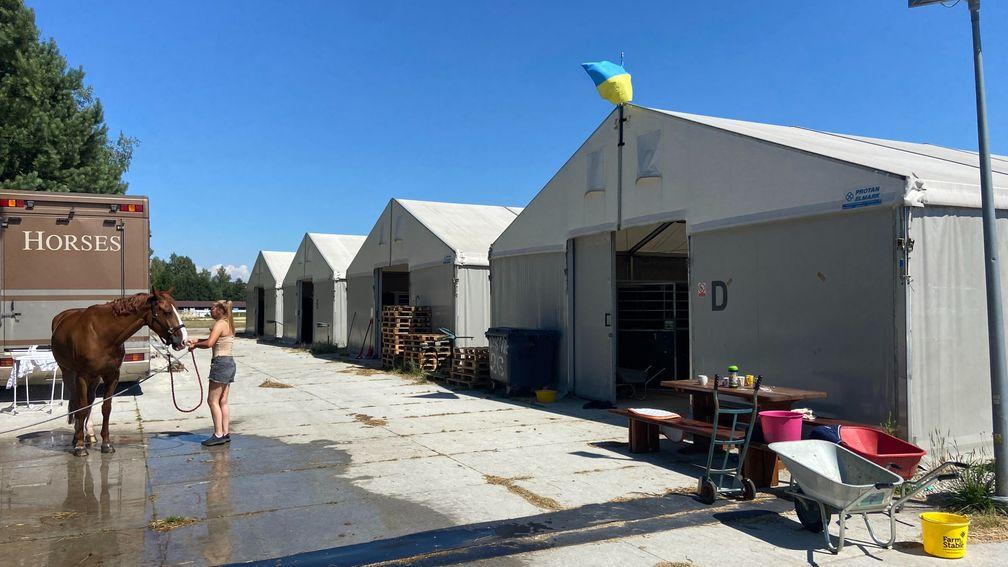
"Originally, horses were in fairly good nick as they'd only been without food for a couple of weeks," Thornycroft says. "They were dehydrated, tired and hungry but they were okay. It's progressively got worse and the ones I'm getting now are covered in ticks, cuts and are often emaciated.
"They have minor injuries caused by being on a lorry for a few days, and several lorries have been shot at. The first two horses who arrived a few weeks ago were dead. Then in the next lot, one was cast and got stuck underneath another. He was battered and broken but we patched him up. I get a lot of colic when they arrive, which is why I don't sleep for days."
Behind every animal is a person, and it did not take long for Thornycroft's role to evolve beyond rescuing hundreds of pets. She is the linchpin of the hub and has become a key contact in the area. In addition to mucking out up to 65 horses a day, she has stood at train stations to direct people away from traffickers, set up a nursing home and orphanage, helped with visa processes and driven traumatised refugees to abortion clinics.
Thornycroft has bought horses, often at her own expense, and collected weapons and supplies for the army. The hub is a key storage facility and through a close network of volunteers she has helped deliver essential supplies, including fire extinguishers. All of the Ukrainian firefighters were called up to fight and she has been helping to train women over Zoom.
She does all of this completely unpaid while she rents out her London flat and, while she is not in the market for praise as for her this is an ongoing responsibility, she is an inspiration. If only people like her ran the world.
"I thought we'd go out, round up the horses and bring them back but that was never going to happen," adds Thornycroft. "As soon as the first horse arrived we had to sort out visas for their owners and look after the horse.
"The animals come with people and you're the only one there to sort it. If I walk away, then it will all stop, but I can't leave as every time the phone rings it's somebody else who is desperate. By the time they've got to me and we're communicating with Google Translate, they've nowhere else to turn. They have exhausted every avenue so we have to find solutions.
"You then become involved in their story and have to find them the next place to go to. You're responsible for them, whether they're 16 or 65. You have to look after each human, dog, horse, cat, rabbit and anything else that comes over here as you are the only person there to support them. I feel 100 per cent responsible for every breathing thing that arrives here."
Thornycroft encounters tragedy on an almost daily basis. The stories she has heard must have left a mark but she feels such a strong sense of duty to the people and their animals that she is determined to carry on.
"I had to take an 11-year-old for an abortion," says Thornycroft. "She said she'd rather die than have a Russian baby. We found her hidden in a lorry; even the driver didn't know she was there. She lived in an area occupied by the Russians where mobiles are checked and social media is banned.
"If you've used WhatsApp or any social media your phone is confiscated and you're taken to a camp, much like those in the second world war. I'm not 100 per cent sure what happens but some time later you're sent back.
"The girl's mother had used Instagram, so the Russians came and beat her up and raped her. They killed her brother, who was eight, and made her dig her family's graves while she was assaulted. She was left for dead. She climbed aboard the lorry and arrived here four days later."
It is a difficult story to listen to without choking up. How does Thornycroft handle dealing with these situations?
"There's an element of keeping busy but it's more you can't show weakness around the people who have fled Ukraine. You have to be strong and remain positive for them," she says.
"You can't show you're horrified by hearing difficult situations – you can't react that way. That's the situation and it's their story. I've cried every single time a person has left and, once they've gone, I'll take a horse out to graze and sob into their mane. I'm lucky but a lot of volunteers just have each other and have turned to alcohol and other substances."
Monday, June 27 —Przemysl
Sky News: Nato to increase forces on high alert to more than 300,000
We head to the town of Debica, roughly 40 minutes west from the equine hub, to drop off the first batch of supplies at a makeshift refugee centre. In normal times it is a gym run by former Olympic boxer Andrzej Rzany. He competed in Athens in 2004 and was stopped in the quarter-finals.
It is an unassuming building and the name of the centre is written on a flag combining the Polish and Ukrainian flags. Feed and electric fencing is carried in excruciating heat into a spacious wood-floored gymnasium. The electric fencing will be taken into Ukraine and is a practical alternative to the challenges of transporting lots of horses into the EU.
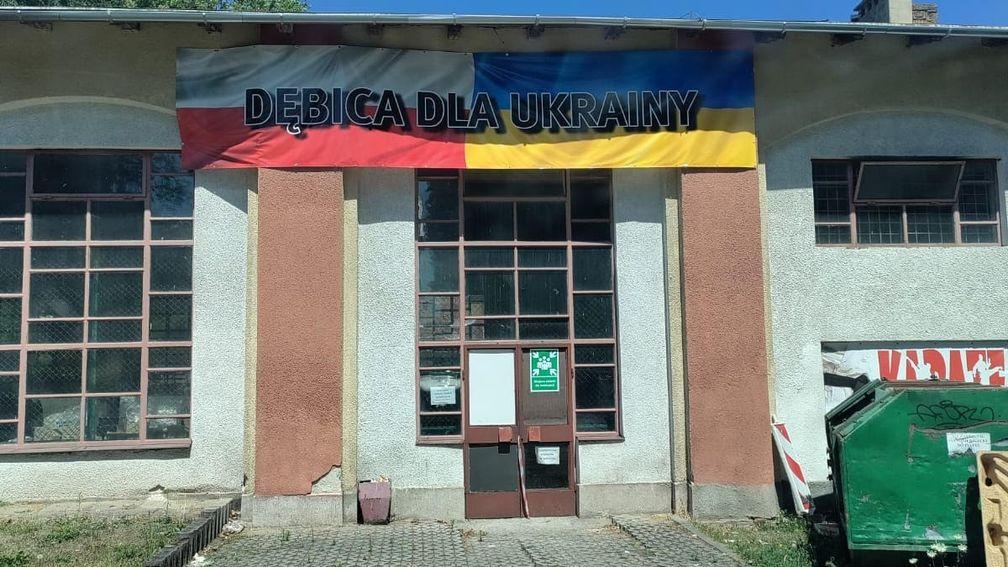
Horses in Ukraine largely live in stone stables so they have little chance of escaping if a bomb hits. The war is concentrated in the east so the fencing will enable horses to be kept safely outdoors during the summer – the first batch will go to Irpin, where there are many unexploded mines.
However, it may be only a temporary fix. It will work well while horses can graze in the summer but there is a fear the war will lead to winter food shortages, which is why it is imperative the equine hub remains open.
Our next stop is the main refugee centre in Przemysl, where we drop off humanitarian supplies including shoes, suitcases and a wheelchair, which was donated to Bennet by a family who had suffered a loss of their own.
It is known locally as the Tesco centre, as it used to be a supermarket, and there are groups of people gathered outside. We are told the building is owned by a German businessman who has put its redevelopment on hold and continues to pay the utility bills. There is a concern that many of the supplies are not reaching their intended targets and we are told some of the people trying to take the items are not genuine refugees.
The feeling is the local government ought to be doing more to maintain the centre. We are told that around 3,000 people arrived by bus last week from the coastal city of Mariupol, which is now under Russian rule after a brutal three-month siege, and had to be turned away. They were placed on trains to a larger centre in Warsaw.
We often witness scenes from refugee centres on TV but nothing can ever prepare you for seeing displaced people with your own eyes. The conflict is so vast that it is almost beyond comprehension but war comes at an immense cost and we begin to understand this after entering the centre.
Checks complete, we walk past a man in military uniform to find two of the walls are lined with desks, above which there are the flags of most major countries. The British one is run by a Christian group called Love Bristol and two Union Jacks have been stuck above the desk, complete with a picture of the Queen's face on each. After arriving at the centre, life-altering decisions have to be made quickly by desperate, tired people.
There are various stations in the middle of the room with corresponding flags and these are filled with cabin beds. Here, families are able to sleep in four-hour stints, as there are not enough beds to go around even though many refugees have been placed with host families in the town.
It is difficult to see but what is most striking are the children's play area made out of wooden slats and an old woman clutching her bag on a cabin bed. She should be living in peace and quiet at home, not here. The play area has a desk next to it with two chairs where children can speak to a trained counsellor. The war has cost an entire generation their childhood and it will take them years to recover.
"Today has probably been the toughest day I've spent out here and the full range of human emotions are put through their paces at top speed," Bennet says. "There were times when I thought I would burst into tears due to the enormity of it all but the fear that if I started crying I would never stop meant I kept myself from pressing that self-pity button."
We encounter tearful, frightened people, whose old lives are packed into carrier bags. It is easy to feel weary, but there is great camaraderie among the volunteers. You have to check yourself. We have it all so easy.
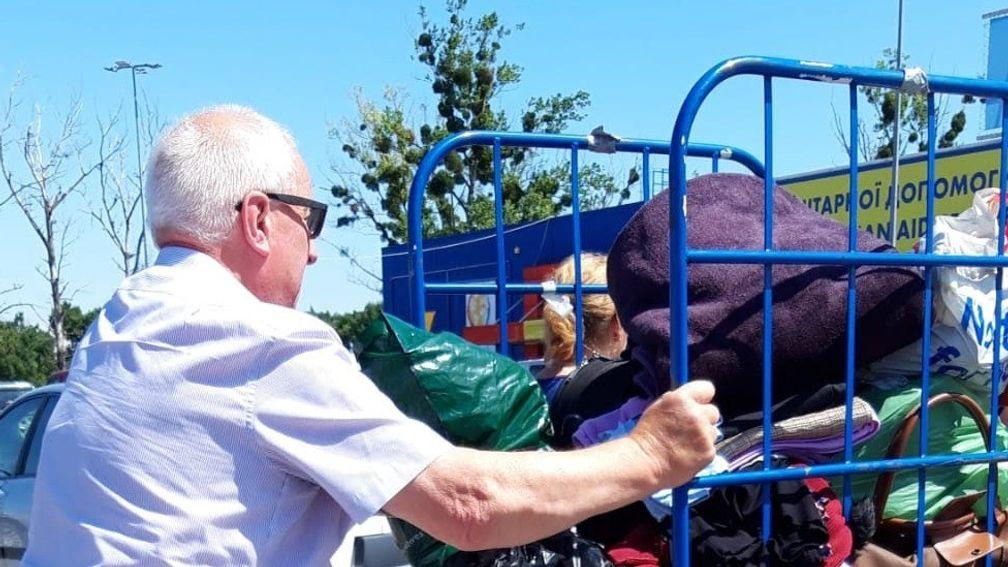
Our next stop is a small storage facility in Medyka, a village so close to the Ukrainian border that our phones jump forward an hour to the new timezone. We are delivering humanitarian supplies and we pass a queue of lorries and cars trying to get back into Ukraine. It extends for miles.
Many hope it is safe to return, if only briefly, but the war is far from over. It takes some people three or four days to cross the border, from either direction, and a military vehicle on a lorry flashes past on the motorway. We see many signs for Lviv, which has been struck by Russian missiles.
During our three drop-offs we meet a group of volunteers who had originally intended to sign up for the Ukrainian military but found their efforts were best directed at delivering aid over the border. Rather than deal with larger aid organisations, they take supplies right to the source, often bribing their way through checkpoints using chocolate and treats.
They are completely unaffiliated and have formed an unlikely family. They are from different countries but are bonded by their impulse to help take a broad range of supplies, including drugs and tourniquets, over to Lviv.
Given they operate in a legally grey area, they must remain anonymous but among their number are a young man from Ireland who used to drive a bin lorry and a Canadian woman who served in Afghanistan as a medic. She strides in with a bag of McDonald's after delivering emergency medical supplies over the border and explains how her time spent at the refugee centre inspired her to take a direct approach to delivering aid.
She is formidable without being unfeeling. What she has seen and heard has had a profound impact on her and, while she takes no joy in telling us, she is eager for the truth about the war crimes being committed to be known.
The details are disturbing. Systemic sexual assault against children. The pulling of teeth so women cannot resist. They are not things that can just be brushed off lightly. My stomach sinks.
"It's beyond depraved," she says, visibly moved. She says the situation in Ukraine is 100 times worse than in Afghanistan. The stories turn over in my head and I struggle to make peace with them, and still have not. Our next trip in the van is a quiet one. There is nothing left for us to say.
Tuesday, June 28 — Dabrowa Gornicza
Yahoo: Russians launch two missile strikes on Kharkiv
Every displaced person has the date they left home etched in their mind and the Ukrainian couple we collect from the refugee centre in Przemysl are no different. Anatoliy and Nataliia left Odessa in March and thanks to Bennet, Thornycroft and Love Bristol, they will have a new life in the UK.
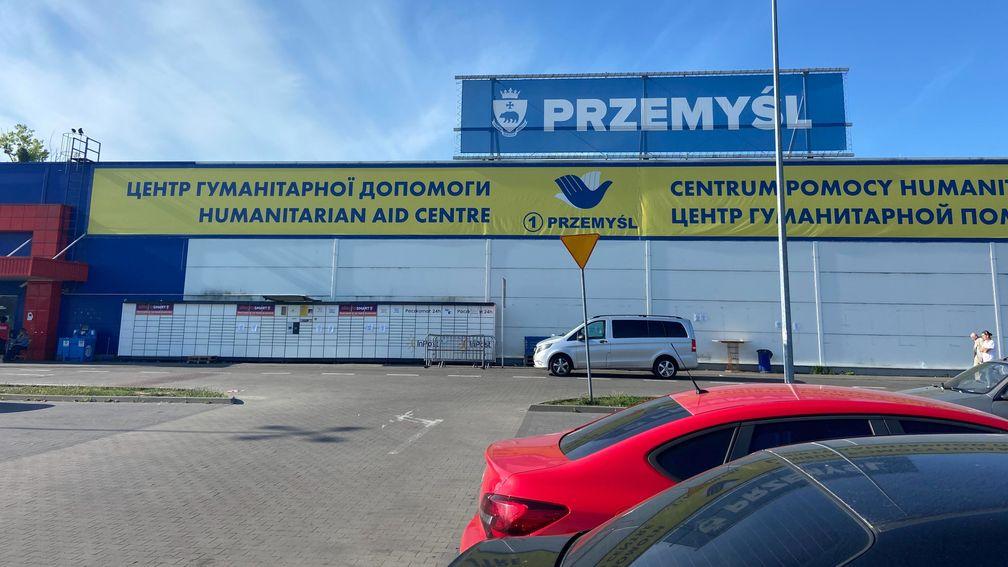
Bennet, who is part of the National Association of Racing Staff executive and, even more impressively, has fostered 16 children in Lambourn, was the first point of contact for the couple when we met them at the centre. After picking up the couple, both in their sixties, Bennet drove them to say goodbye to their host and some friends. They were staying with a deaf preacher, but he was in a neighbouring town and unable to say goodbye.
They have had to leave behind their children – their son was called up to fight – and their grandchildren, whose passports are being arranged. The last few months have, unsurprisingly, made an impact and one can only imagine the conflicting emotions. There is the relief of moving towards a more settled existence near Bristol, without uncertainty, but there is the realisation that the further they travel, the further they are from home.
It takes a huge leap of faith for them to place their life in the hands of complete strangers and it is a privilege to meet them. There are lots of hugs and tears as they leave their host family but the volunteers are on hand to put them at ease. "We're going to help you," says Sharon Ingram, wife of trainer Roger. It becomes clear that empathy is as natural to her as breathing and they are soon sharing pictures of their families.
Language is not a major barrier. The team is able to demonstrate compassion without words but with hugs and smiles. Anatoliy and Nataliia did not need to be told. They knew they were surrounded by good people, and even contacted their host to say so.
After dropping off the last of our supplies of dog and cat food at a hub near Przemysl, it is time to start the long journey home, but not without an important detour. I join Bennet in the smaller horsebox and travel to the city of Dabrowa Gornicza to pick up a Ukrainian grandmother, Alla, and her granddaughter, Anna, as well as their cats Leah and Simba.
We had hoped to have horses too, but there was a hold-up on the border, which is common. We do, however, have a Great Dane called Bella. She weighs in at 60kg and was something of a mascot for the equine hub.
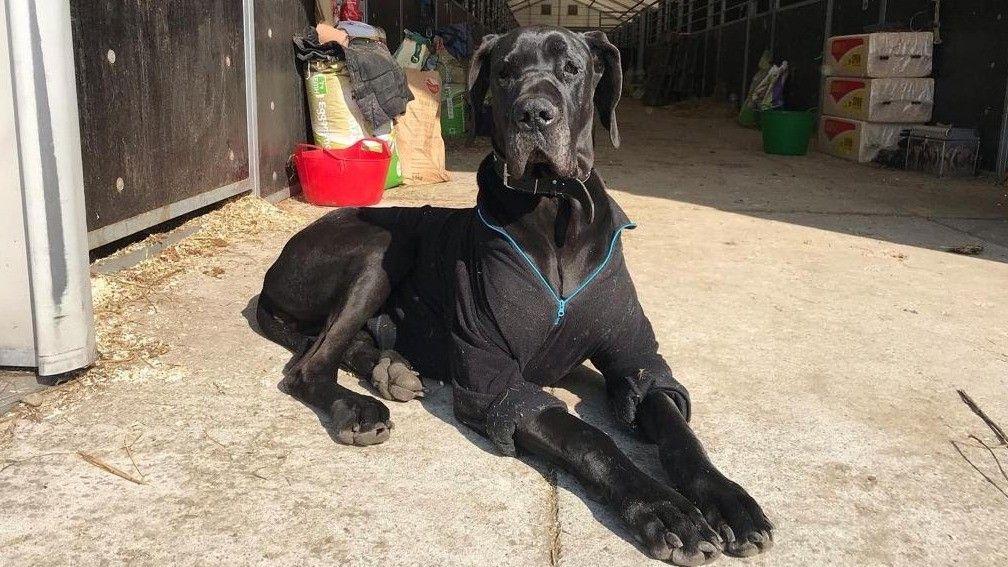
Our satnav takes us on a brief tour of the city but we eventually find their temporary home and we spot a teenage girl waving from the window. Her English is impeccable and we are soon loading their suitcases into the van. They then share a brief goodbye with their host before we set off.
They are from Kharkiv, where Alla had been studying at university, and left the city on March 9. The historic city has been relentlessly bombed and was described as being "like Chernobyl" by residents in a BBC story.
The more you hear, the harder it is to understand why this is happening to innocent people. It is a grey afternoon as we pull out of the city but there are still glimmers of hope, with Alla and Anna set for a second chance in Leeds.
Wednesday, June 29 — Hook of Holland
Reuters: Russian troops withdraw from Snake Island overnight
Following a brief stop off at a campsite near Leipzig, which we tried to pretend was Glastonbury to make it more bearable but ultimately left early, we arrive at the Hook of Holland and a weight immediately lifts.
Humour has served as an extra layer of armour throughout this trip but the mood is noticeably lighter now. After all, being entrusted to move four people and three animals most of the way across Europe is a responsibility and the fact we have only the ferry between us and the UK is a blessing.
Anatoliy, who has been through a rollercoaster of emotions since joining our merry band, smiles deeply as he steps off the lorry and gives me a big bear hug before taking Bella for a walk. The dog actually suits him.
He has struck up an amazing friendship with Dormer, who took his duty to make him feel at ease incredibly seriously. The 69-year-old asked if the team would be interested in recruiting a "retired pensioner with terminal cancer". I was so glad they were. He stayed behind at the hotel one morning to ensure our new passengers did not think we had left without them and exchanged stories using Google Translate throughout the trip.
His outlook on life is refreshing. He was retired due to his illness and, after undergoing chemotherapy, spent much of the last two years indoors during the pandemic as he was classed as clinically vulnerable. After a life spent in racing, including as a box driver and as head lad to a number of trainers, Dormer said he felt a bit useless, but not any more.
"I'm proud of what we've achieved," he says, sipping on a cup of tea in the McDonald's by the port. "We did what we set out to do, which was to help the animals and people coming to the UK. It's been tough and some things broke my heart, but you need to see them to understand.
"I was sitting at home doing nothing and thought I could help on the trip. It gave me some sort of purpose and made me feel like I could make a difference to somebody else. I can't change having cancer. I'll never be able to. I might not die of it but I will die with it, and I can't change that. But I can make a difference to the lives of the people we brought back."
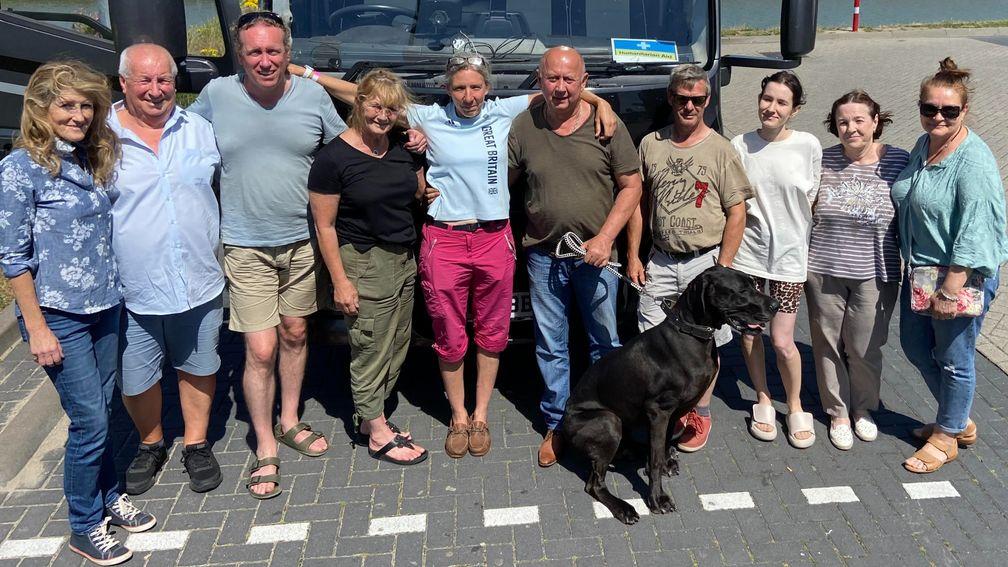
The volunteers should be proud of what they have done, not only their efforts delivering aid to animals and helping people on the way to building a life away from the most brutal of conflicts but in opening themselves up to the challenging stories and situations they have faced along the way. It has not been an easy journey but the consensus is it has been rewarding.
The electric fencing the team delivered is already en route to Ukraine, enabling more horses to be kept safely rather than undertake the tough journey over the border, the first-aid kits will enable more children to attend school and the dog and cat food will continue to plug a big gap.
None of this would have been possible without Thornycroft and the kind donations made to Kelleway's JustGiving page, mostly from people in the racing industry, but the need for aid will not disappear overnight, even if the war ended tomorrow, because it has caused such terrible destruction.
It goes far beyond just rebuilding cities but rebuilding people's lives too. Many of them depend heavily on Thornycroft, who is reliant on donations and her own money to keep the hub, which is a key staging post, going.
The trip has been a stark reminder that there is an awful lot of evil in the world. We have heard of unspeakable horrors taking place over the border and witnessed the tragedy of people just surviving in refugee centres. It is unclear what the future holds for them.
But there is good too and I feel lucky to have witnessed so much empathy and compassion from an eclectic group of mostly racing people brought to the other end of the continent by the simple desire to do the right thing. They could not fix the problem but chose to do something.
There is hope everywhere if you look hard enough. It is in Kelleway's push for donations, Thornycroft's willingness to put her life on hold to support the hundreds of people and animals that rely on her and in Bennet's clear resolution to help give four wonderful people a brand new start in the UK.
These things help to restore some faith in humanity and it should always be known that when the people and animals of Ukraine needed help, the racing community and this group of volunteers stepped up and answered.
If you would like to support Thornycroft's work and future aid missions, please consider donating to this JustGiving page

Stay ahead of the field with 50 per cent off the ultimate racing subscription. Enjoy the Racing Post digital newspaper and award-winning journalism from the best writers in racing. Plus, make informed betting decisions with our expert tips and form study tools. Head to the subscription page and select 'Get Ultimate Monthly', then enter the code BESTOF50 to get 50 per cent off your first three months.
First three payments will be charged at £19.98, subscription renews at full monthly price thereafter. Customers wishing to cancel will need to contact us at least seven days before their subscription is due to renew.
Published on inSeries
Last updated
- We believed Dancing Brave could fly - and then he took off to prove it
- 'Don't wind up bookmakers - you might feel clever but your accounts won't last'
- 'There wouldn't be a day I don't think about those boys and their families'
- 'You want a bit of noise, a bit of life - and you have to be fair to punters'
- 'I take flak and it frustrates me - but I'm not going to wreck another horse'
- We believed Dancing Brave could fly - and then he took off to prove it
- 'Don't wind up bookmakers - you might feel clever but your accounts won't last'
- 'There wouldn't be a day I don't think about those boys and their families'
- 'You want a bit of noise, a bit of life - and you have to be fair to punters'
- 'I take flak and it frustrates me - but I'm not going to wreck another horse'